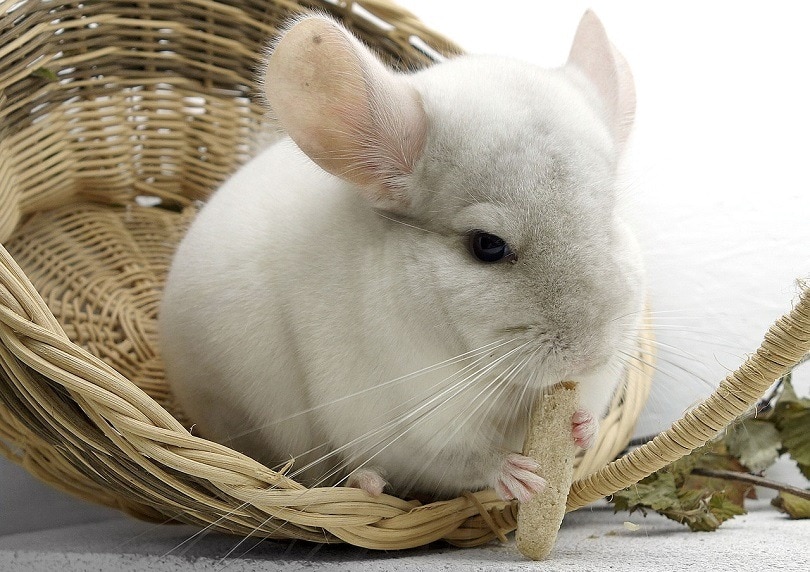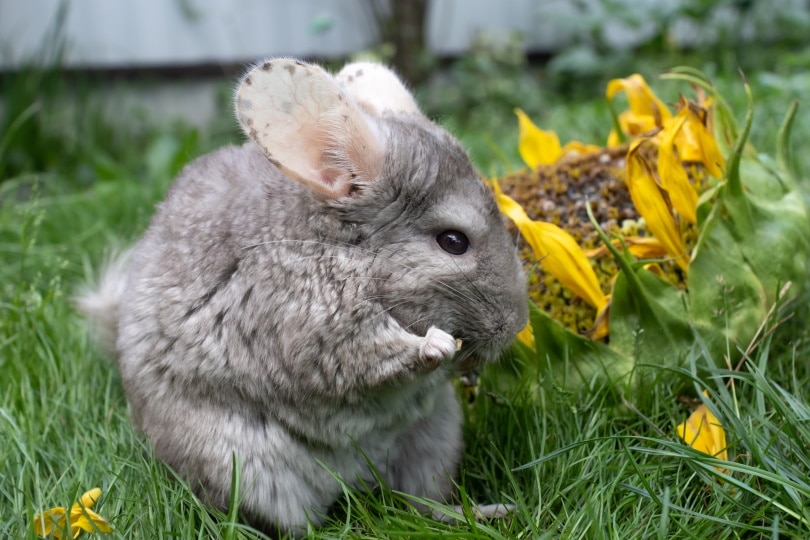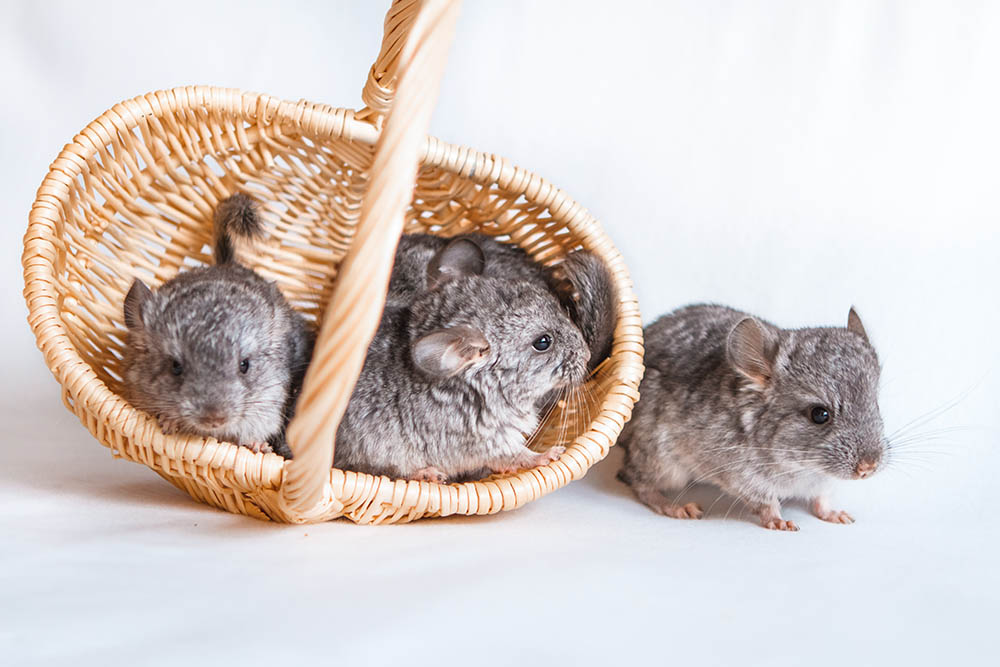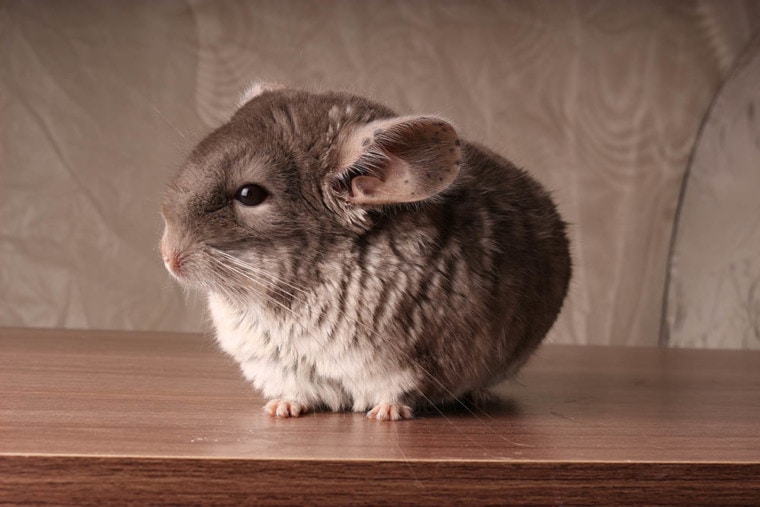
Domesticated chinchillas are docile and friendly creatures if you are affectionate, too. They rarely bite and can learn to tolerate and eventually enjoy human companionship.
Understandably, they are less affectionate with young kids and novice owners in the first few weeks of adapting to their new surroundings. But with time and affection, chinchillas are social and friendly pets once they recognize and trust their owner.
They can show that they don’t like you by spraying you with pee, biting you (although very rare), a response known as a fur slip, or hiding from you. To acquire a chinchilla’s trust, you need to be respectful and kind and offer your pet space when necessary.
Establishing Trust With Your Pet
There’s no one-size-fits-all method of establishing a bond with your pet. Just like us, chinchillas have individual personalities. Their personality can be further molded by their experiences and interactions with people in the past.
Therefore, you might be fortunate enough to have a chinchilla that’s relatively outgoing; however, this also means you have a pet that may demand extra attention from you. Alternatively, you might’ve adopted a relatively shy pet, and they may need some time before they eventually trust you. However, the following guidelines can help ensure you’re on the correct path to bonding with your pet.
Most healthy domesticated chinchillas with no history of trauma or abuse will readily learn to socialize with humans in no time. One of the earliest cues of your chinchillas warming up to you is that they will place their forepaws on your hand.

How Do Chinchillas Show Affection?
Chinchillas are incredibly social creatures. They have developed various ways to show trust and friendship, and these are vital for your companionship with your pet and between chinchillas.
Spending Time with You
This is the best and simple way to tell whether a chinchilla likes you. If your chinchilla wants to display affection, they will spend time close to you. Your pet may sit near you on your shoulder or lap and look for cuddles in your presence.
However, if they don’t trust you, they will avoid you. When you let them out of their cage, they will not sit or stay near you and instead avoid you. Please note that letting a pet that doesn’t trust you out of their cage is considered a poor decision, as they will likely avoid you when it’s time to place them back in their cage, and the stress of being captured to be returned to their cage will likely be counterproductive for the human-animal bond.
Licking You
Chinchillas may playfully lick you if they enjoy your companionship. It is thought that this is similar to an attempt at grooming you.
Chinchillas with Other Pets
It is not advisable to allow your chinchilla to spend time with other pets. That includes larger pets such as dogs and cats and smaller pets such as rabbits and other rodents.
There are a few reasons why. First, other creatures make your chinchilla feel vulnerable and threatened. That is particularly the case of larger animals, which your chinchilla tends to avoid since they think they might be predators.
However, even a miniature and non-threatening creature may cause your pet stress, as your chinchilla thinks they are a threat to their habitat and resources such as food. Because your chinchilla feels threatened around other animals, they will not be friendly towards them.
The second reason is that your other pets may not understand that the chinchilla is a companion and might attempt to hunt them. At times, it’s important to remember that one pet considers “play” might be far too traumatic and dangerous for another pet. For example, a cat can easily injure a chinchilla while they hunt them.
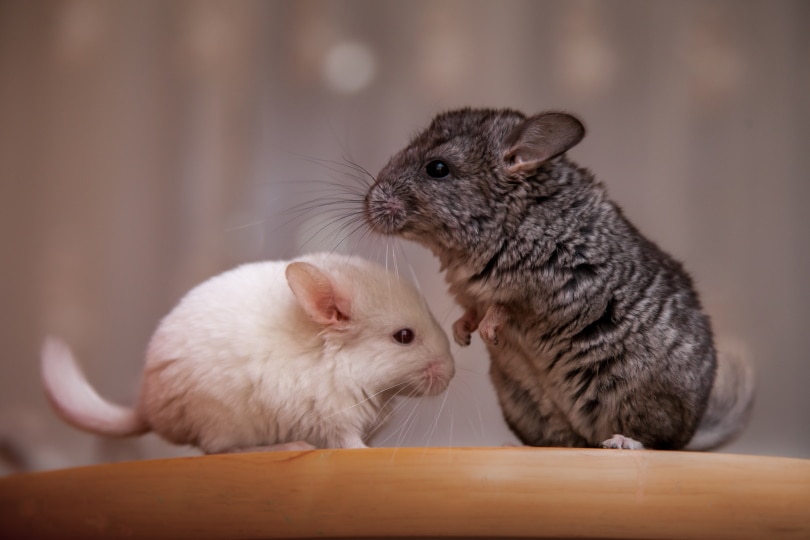
Chinchillas With Children
Chinchillas can get along well with children with proper supervision. However, it depends on how well the child understands the personality and needs of their pet.
There are various ways in which a child may inadvertently hurt a chinchilla. A child’s impulsive nature may sometimes lead to them grabbing a chinchilla too tightly, something they don’t view as comfortable. Additionally, chinchillas don’t like being picked up and moved around quickly. A sudden tug or pull from a child may startle a chinchilla.
It is important to note that chinchillas have a reflective reaction to dangers known as a fur slip, where they suddenly dislodge a large amount of fur in an attempt to escape a threat that’s holding onto them too tightly. This results in a large patch of skin. Should fur eventually regrow in the bald spot, it is often a different color or shade than their original coat.
Nonetheless, children can definitely be taught how to properly behave around a chinchilla and how to interact with them safely to ensure their comfort.
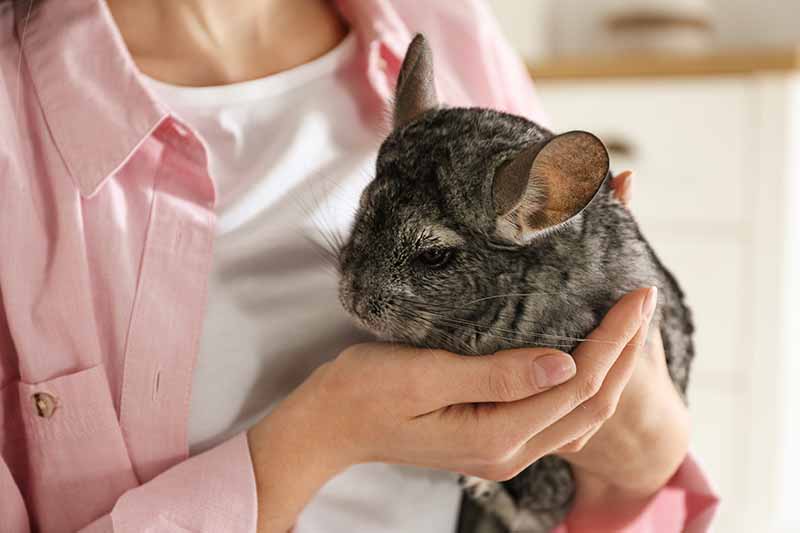
Why Would a Chinchilla Be Unfriendly?
The primary point of consideration here is understanding that claiming your pet is “unfriendly” is an adjective you’re using to describe them and likely not a true reflection of their personality or behavior.
In almost all instances, chinchillas that aren’t receptive towards their handlers are acting as such out of fear and a lack of trust. Being prey animals, chinchillas (though domesticated) still have an intrinsic fear of larger animals (including you), especially if they are new to an environment.
Fortunately, most chinchillas can easily learn to recognize their owners as “friendly” and quickly become trusting. However, the process may take longer for some individuals than others and, in particular, will take longer if a chinchilla hasn’t been adequately socialized at a young age.
Chinchillas may also display some aggressive behavior if they are intact—towards other chinchillas and humans as well. Consult your veterinarian if your pet is intact. Almost all pet chinchillas are neutered for their health and welfare.
Final Thoughts
Most chinchillas are friendly in many situations, provided you remain patient and develop a strong bond with them.
A chinchilla needs to rehearse the surroundings and learn the owner’s smell, voice, and touch. Once accustomed to you, give them time outside the cage to interact with you in a proofed space and allow the relationship to grow and thrive. Rushing the process may lead to a startled pet that bites. It will not take long until you have a solid bond with your chinchilla, and both of you will enjoy playtime together.
- Related Read: How Do Chinchillas Bathe in the Wild?
Featured Image Credit: Natalis.ph, Shutterstock



